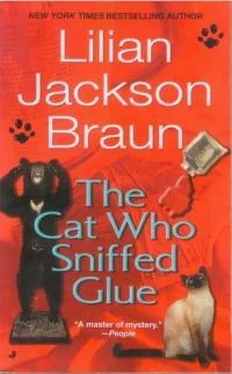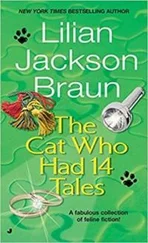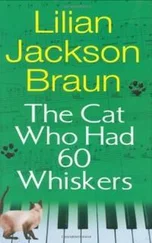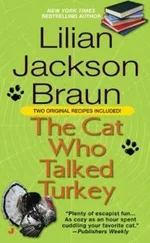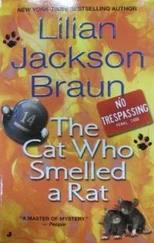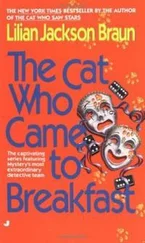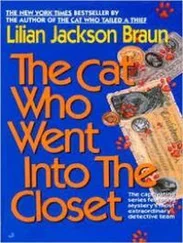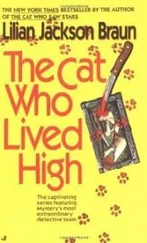It was true. Page seventy-two looked flawless.
As Winston jumped onto the workbench where they were sitting, the bookman said, "He always comes into the bindery when I'm working. He likes the smell of glue and paste."
"Koko likes to sniff glue, too. What kind do you use?"
"Nothing synthetic. I make my paste out of wheat flour or cornstarch. The glue comes from animal hides. I buy it in sheets and melt it. Did you know it's the glue used in bookbindings that attracts bookworms?"
As Eddington talked about his craft, he was no longer the shy man who ran the bookshop with a soft sell and whispered his lines at the Theatre Club. He spoke softly but with authority and demonstrated book-binding operations with skilled assurance.
"How did you get interested in books?" Qwilleran asked.
"My great-grandfather was a book collector. You know the town called Smith's Folly? He founded it in 1856. His mine failed twice, but the third time he struck it rich."
"What happened to your great-grandfather's fortune?" Qwilleran asked as he glanced around the room. In the far comer there was an uncomfortable-looking cot, a folding card table with a solitary folding chair, a small sink with a mirror hanging on the wall above it, and a shelf of dishes and canned goods.
"I'm sorry to say the next generation spent it all on lovely ladies," said Eddington, blushing an unhealthy purple. "My father had to earn his living selling books from door-to-door."
"What kind of books?"
"Classics, dictionaries, encyclopedias, etiquette books - things like that. People with no education wanted to improve themselves, and my father was like a missionary, telling them to read and live better lives. He never made much money, but he was honest and respected. As somebody said, 'Virtue and riches seldom settle on one man.' "
"And how did you get into the used-book business?"
"An old man died, and they threw his books on the dump. I carted them away in a wheelbarrow. I was only fourteen. Now I buy from estates. Sometimes there's an odd book in the lot that's worth something. I found a first of Mark Twain in a box with some old schoolbooks and etiquette books. And once I found a book that Longfellow inscribed to Hawthorne."
"In your ad you mentioned library care as one of your services. What does that entail?" Qwilleran asked.
"If a customer has a good private library, I go and dust the books and treat the leather bindings and look for mildew and bookworms. Most people don't even know how to put books on a shelf. If they're too far apart, they yawn, and if they're too close together, they can't breathe."
"Are there many good private libraries in this area?"
"Not as many as before. People inherit them and sell the books to buy yachts or put their children through college."
"Could you name some of your clients?"
"Oh, no, that wouldn't be ethical, but it's all right to say that I took care of the Klingenschoen library when the old lady was alive."
"How about the Fitch mansion? Off the record." Qwilleran turned off the tape recorder. "I've heard they have some rare books."
Almost in a whisper the bookseller said, "Cyrus Fitch's collection is worth millions now. If they sell it at auction, it'll be big news all over the world."
"Do you suppose the burglars who shot the young couple were after rare books?"
"I don't think so. Not around here. Unless..."
"Unless what?"
"Oh, nothing. Just a silly thought." Eddington looked embarrassed.
"Are there professional book thieves - like the art thieves who steal old masters - who might come up here from Down Below?"
"I never thought of that. I should check the books against the inventory. But first I'd better talk to the lawyer."
Qwilleran asked, "How long have you been making house calls to the Fitch mansion?"
"Almost twenty-five years, and when Mr. and Mrs. Fitch moved out, they told me to keep on taking care of the library."
"So you knew Harley's bride. What was she like?"
Eddington hesitated. "She had a pretty face-very pretty. A little-girl face. Idon't like to say anything unkind, but... she used to say some words that I wouldn't repeat even in front of Winston."
"What was her background?"
"Her name was Urkle. She came from Chipmunk. Of course, I knew her before Harley married her. She was one of Mrs. Fitch's maids."
Qwilleran remembered Mr. O'Dell's remark: "He married the wrong colleen." To Eddington he said, "One wonders why Harley would choose a girl of that class."
" 'Love makes fools of us all,' as Thackeray said. I think it was Thackeray," said the bookseller.
Qwilleran stood up. "This has been an enlightening session, Edd. A photographer will come around tomorrow to get a few shots."
"Maybe I'd better clean the front window."
"Don't overdo it!"
On his way to the exit Qwilleran stopped and asked, "When would you normally make your next house call to the Fitch collection?"
"Tuesday after next, but I don't know what to do now. I'll have to talk to the lawyer. I don't want to bother Mr. Fitch, but the books should be taken care of."
"I'd appreciate it if you'd take me along," Qwilleran said. "I might learn something."
"Shall I ask the lawyer if it's all right?"
"No, just take me along as your assistant. I'm good at dusting."
As Qwilleran walked home he marveled at the knowledge of the modest, self-educated little man, at his complete joy in working with books, and at his shabby living quarters. He remembered the narrow cot, and the sad table and chair, and the shelf above the sink. On it were a cup and plate, a dented saucepan, some canned soup and sardines, a razor and comb, and a handgun!
Arriving at his apartment he knew there was a message on the answer-box even before he reached the top of the stairs. Koko's mad racing back and forth told him the phone had been ringing in his absence.
The message was from Francesca. She would drop in at five o'clock. She had some stunning wallpaper samples for his bedroom. She also had some news, she said.
-Scene Nine-
Place: Qwilleran's apartment; later Stephanie's restaurant
Time: The same day
QWILLERAN went into his studio to organize his thoughts and compose a catchy lead for the Eddington Smith profile, taking care to confine the cats to their apartment.
Ordinarily they assisted his creative process by sitting on his notes, biting his pen and stepping on the shift key of the typewriter, but this time he had a firm deadline. The Siamese were banished.
The job required concentration. In his workshop Eddington used a strange vocabulary: giggering and glairing; nipping up, blinding in, holing out, wringing down and fanning over; casing in, lacing in, and gluing up.
Eddington had said that Winston liked the gluing-up process. Was Koko smelling the glue when he sniffed the spines of books as if reading the titles? Could a cat possibly smell the glue on a seventy-five-year-old volume of Dickens or a century-old Shakespeare? It hardly seemed likely. But, ruling out glue as the attraction, why did Koko sniff books? Why did he sniff certain titles and not others? Were there bookworms in the bindings? Could he smell animal matter? When they spent the summer months in the country, the Siamese were always fascinated by ants, spiders, and ladybugs on the screened porch. Why not bookworms? Qwilleran decided he would ask Eddington to inspect Koko's favorite titles. The cat had suddenly become interested in Moby-Dick and Captains Courageous.
These ruminations were not helping him meet his deadline, and when Francesca arrived with her wallpaper samples, he said, "Excuse me if I appear groggy. I've been working on a profile of Edd Smith, and I'm in a bookish fog. Tell me your news, Fran."
"First, a drink," she said, collapsing on the sofa. "First the news," Qwilleran insisted, "and then a drink.'"
Читать дальше
